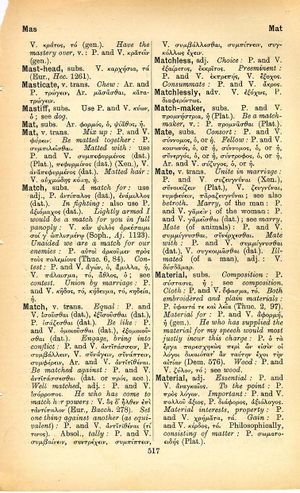mate: Difference between revisions
From LSJ
ἀλλ' ἦν ἅπαντα τεταγμένα νόμων ἐπιταγαῖς → but all their acts were regulated by prescriptions set forth in laws
(CSV4) |
m (Woodhouse1 replacement) |
||
| Line 1: | Line 1: | ||
{{Woodhouse1 | {{Woodhouse1 | ||
|Text=[[File:woodhouse_517.jpg|thumb|link={{filepath:woodhouse_517.jpg}}]] | |Text=[[File:woodhouse_517.jpg|thumb|link={{filepath:woodhouse_517.jpg}}]] | ||
===substantive=== | |||
[[consort]]: [[prose|P.]] and [[verse|V.]] [[σύννομος]], ὁ, or ἡ. | |||
[[fellow]]: [[prose|P.]] and [[verse|V.]] [[κοινωνός]], ὁ, or ἡ, [[σύννομος]], ὁ, or ἡ, [[συνεργός]], ὁ, or ἡ, [[σύντροφος]], ὁ, or ἡ, [[Aristophanes|Ar.]] and [[verse|V.]] [[σύζυγος]], ὁ, or ἡ. | |||
===verb transitive=== | |||
[[unite in marriage]]: [[prose|P.]] and [[verse|V.]] [[συζευγνύναι]] ([[Xenophon|Xen.]]), [[συνοικίζειν]] ([[Plato]]), [[verse|V.]] [[ζευγνύναι]], [[νυμφεύειν]], [[παραζευγνύναι]]; see also [[betroth]]. | |||
[[marry]], of the man: [[prose|P.]] and [[verse|V.]] [[γαμεῖν]]; of the woman: [[prose|P.]] and [[verse|V.]] [[γαμεῖσθαι]] (dat.); see [[marry]]. | |||
[[mate]] (of animals); [[prose|P.]] and [[verse|V.]] [[συμμίγνυσθαι]], [[συνέρχεσθαι]]. | |||
[[mate with]]: [[prose|P.]] and [[verse|V.]] [[συμμίγνυσθαι]] (dat.), [[verse|V.]] [[συγκοιμᾶσθαι]] (dat.). | |||
[[ill-mated]] (of a man), adj.: [[verse|V.]] [[δύσδαμαρ]]. | |||
}} | }} | ||
Revision as of 08:51, 20 May 2020
English > Greek (Woodhouse)
substantive
consort: P. and V. σύννομος, ὁ, or ἡ.
fellow: P. and V. κοινωνός, ὁ, or ἡ, σύννομος, ὁ, or ἡ, συνεργός, ὁ, or ἡ, σύντροφος, ὁ, or ἡ, Ar. and V. σύζυγος, ὁ, or ἡ.
verb transitive
unite in marriage: P. and V. συζευγνύναι (Xen.), συνοικίζειν (Plato), V. ζευγνύναι, νυμφεύειν, παραζευγνύναι; see also betroth.
marry, of the man: P. and V. γαμεῖν; of the woman: P. and V. γαμεῖσθαι (dat.); see marry.
mate (of animals); P. and V. συμμίγνυσθαι, συνέρχεσθαι.
mate with: P. and V. συμμίγνυσθαι (dat.), V. συγκοιμᾶσθαι (dat.).

